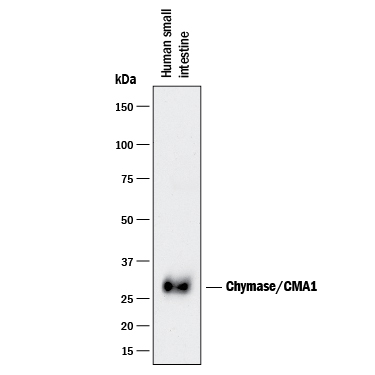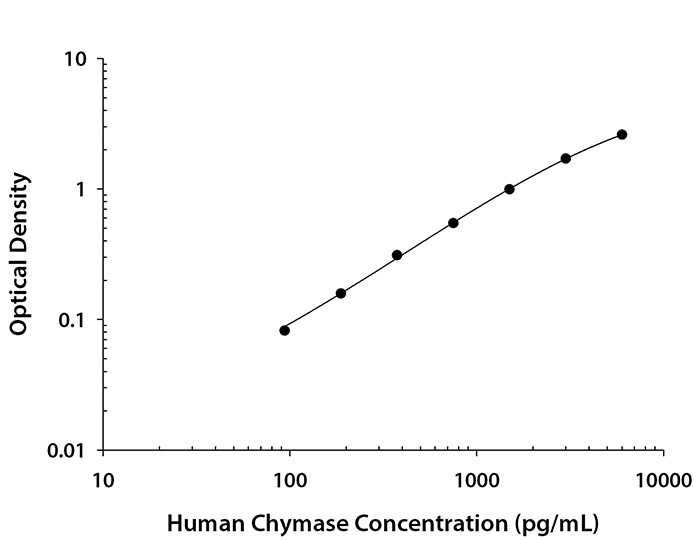Human Chymase/CMA1 Antibody Summary
Gly20-Asn247
Accession # P23946
Applications
Please Note: Optimal dilutions should be determined by each laboratory for each application. General Protocols are available in the Technical Information section on our website.
Scientific Data
 View Larger
View Larger
Detection of Human Chymase/CMA1 by Western Blot. Western blot shows lysates of human small intestine tissue. PVDF membrane was probed with 1 µg/mL of Mouse Anti-Human Chymase/CMA1 Monoclonal Antibody (Catalog # MAB4099) followed by HRP-conjugated Anti-Mouse IgG Secondary Antibody (HAF018). A specific band was detected for Chymase/CMA1 at approximately 28 kDa (as indicated). This experiment was conducted under reducing conditions and using Immunoblot Buffer Group 1.
 View Larger
View Larger
Human Chymase/CMA1 ELISA Standard Curve. Recombinant Human Chymase/CMA1 protein was serially diluted 2-fold and captured by Mouse Anti-Human Chymase/CMA1 Monoclonal Antibody (MAB40991) coated on a Clear Polystyrene Microplate (DY990). Mouse Anti-Human Chymase/CMA1 Monoclonal Antibody (Catalog # MAB4099) was biotinylated and incubated with the protein captured on the plate. Detection of the standard curve was achieved by incubating Streptavidin-HRP (DY998) followed by Substrate Solution (DY999) and stopping the enzymatic reaction with Stop Solution (DY994).
Reconstitution Calculator
Preparation and Storage
- 12 months from date of receipt, -20 to -70 °C as supplied.
- 1 month, 2 to 8 °C under sterile conditions after reconstitution.
- 6 months, -20 to -70 °C under sterile conditions after reconstitution.
Background: Chymase/CMA1
Chymases are a group of chymotrypsin-like serine proteases secreted by mast cells (1). They are synthesized as inactive precursors containing a 2‑residue propeptide, which needs to be removed by dipeptidyl peptidase I/cathepsin C for the enzymatic activity (2). Human Chymase encoded by the CMA1 gene is known to be involved in hypertention and heart failure through its ability to convert angiotensin I (Ang I) to angiotensin II (Ang II), which plays a key role in the regulation of arterial pressure (3). In addition, it is also important in physiological and pathological conditions including inflammation, fibrosis and processing of cytokines (4). Therefore, designing a specific inhibitor for Chymase activity has been a pharmacologic strategy to develop therapeutic agents.
- Caughey, G.H. (2004) in Handbook of Proteolytic Enzymes. Barrett, A.J. et al. ed. p. 1531, Academic Press, San Diego.
- Murakami, M. et al. (1995) J. Biol. Chem. 270:2218.
- Miyazaki, M. and S. Takai (2006) J. Pharmacol. Sci. 100:391.
- Nakajima, M. and N. Naya (2002) Jpn. J. Pharmacol. 90:206.
Product Datasheets
Citation for Human Chymase/CMA1 Antibody
R&D Systems personnel manually curate a database that contains references using R&D Systems products. The data collected includes not only links to publications in PubMed, but also provides information about sample types, species, and experimental conditions.
1 Citation: Showing 1 - 1
-
Chymase uptake by cardiomyocytes results in myosin degradation in cardiac volume overload
Authors: PC Powell, CC Wei, L Fu, B Pat, WE Bradley, JF Collawn, LJ Dell'Itali
Heliyon, 2019-04-04;5(4):e01397.
Species: Human, Rat
Sample Types: Tissue Homogenates
Applications: Western Blot
FAQs
No product specific FAQs exist for this product, however you may
View all Antibody FAQsReviews for Human Chymase/CMA1 Antibody
There are currently no reviews for this product. Be the first to review Human Chymase/CMA1 Antibody and earn rewards!
Have you used Human Chymase/CMA1 Antibody?
Submit a review and receive an Amazon gift card.
$25/€18/£15/$25CAN/¥75 Yuan/¥2500 Yen for a review with an image
$10/€7/£6/$10 CAD/¥70 Yuan/¥1110 Yen for a review without an image

